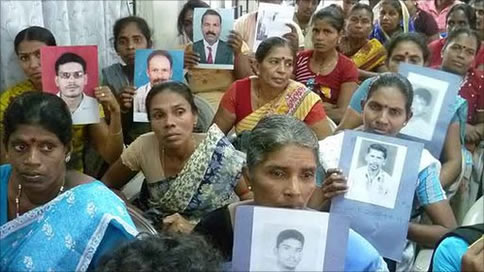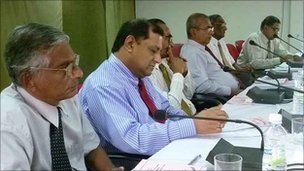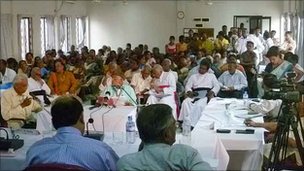Ilankai Tamil Sangam30th Year on the Web Association of Tamils of Sri Lanka in the USA |
||||||||
 Home Home Archives Archives |
Sri Lanka's War Panel Arouses Strong Emotionsby BBC, January 11, 2011
For many relatives, there has been little or no information as to the fate of their loved ones Sri Lanka After War Emotional people have flocked to testify before the Sri Lankan commission looking into the final years of the country's war. Many of those who bore witness in the former war zone said their close relatives had disappeared. Charles Haviland was granted rare access to the hearings in the north-western town of Mannar. In a crowded room in a government building there was an agitated buzz of people talking Tamil. Men and women of all ages held up pictures for the camera - pictures of their missing sons and daughters, husbands and wives, brothers and sisters - with dates of disappearance: January 2008; April 2007. A man tried to organise things, telling them to get their sad case histories ready to submit. Raw emotionsThe people were clamouring to appear before the war commission, its fourth visit to the north.
Before the commissioners arrived they unburdened themselves to us. A woman told us her son aged 17 disappeared eight years ago while tending goats. Perhaps he was taken by the Tamil Tigers (LTTE). He was later seen in an army detention camp but then vanished. An elderly man told us his son disappeared four years ago - the police had not been able to find him. Once they were testifying to the panel, raw emotions came through. A weeping mother, R Bhuwaneswari, clutched a bundle of victims' written testimonies as she addressed the team. Her 15-year-old daughter was forced to stay back by the Tigers as the family escaped the war zone. She was later seen in a government-run camp but is now missing. "Tell her to give the information to the commission secretary," the commission chairman and former attorney-general, CR de Silva, told the interpreter. "We'll try to trace her daughter." 'Nothing happens' But Ms Bhuwaneswari continued speaking. "They all say there's peace, but there's no peace," she cried, weeping. "We people don't have any happiness or freedom. We live with tears. We've reported our missing children to so many but nothing happens. You at least, please give us some good news. There are so many wives crying for their detained husbands.
"If my daughter were here now she would have sat her O-level exams." Another woman, R Virginia Shanthi, said she and many others had been assaulted while their children were taken. Her son disappeared in 2007 on his way to a beer store in an area which she said was under navy control. "We hope you'll dry the tears of these mothers," she told the panel, breaking down. "We are hurt, both mentally and physically. We are becoming ill, thinking about our lost ones." Scores of others waited restlessly to testify but there was not time for many. They were asked to submit written details of their missing family members. Senior Catholic churchmen including the Bishop of Mannar, Rt Rev Rayappu Joseph, had already given a long submission criticising the government and military's actions in the north. He told the BBC he would have liked more time for people to unburden themselves. He wanted them to accept that their relatives were dead and try to get death certificates for them. At a later session the wife of the LTTE's former local commander, Anthony Rayappu, said she had seen him taken away by the army but there was now no clue of his whereabouts. Not independentAt one of the Mannar hearings a soldier in uniform made witnesses nervous as he took photographs of them and the panel. His presence was brought to the attention of commission officials who asked him to go outside.
The commission, which began hearings in August, was appointed by the president and is called the Lessons Learnt and Reconciliation Commission (LLRC). It is supposed to determine who was responsible for the failure of a 2002 ceasefire, suggest ways to prevent another war and foster reconciliation and to promote restitution for those affected. International human rights groups have refused to testify, complaining that it lacks a mandate to investigate alleged war crimes. They also say the panel members are too close to the government and therefore not independent. The government denies this. In May this year the LLRC is to give the president its final report, which may or may not be made public. All of its public hearings so far outside Colombo have been in Tamil-majority areas. But this month it will visit the Sinhalese-majority town of Anuradhapura, where 27 people were killed and 94 injured by an LTTE suicide bomber in 2008. Witnesses have given extremely diverse accounts. Bishop Joseph's team said it believed there were as many as 146,000 people still unaccounted for during the last phase of fighting - a figure higher than most other calculations. But last week Champika Ranawaka, a government minister from a Sinhalese nationalist party, the JHU, declared that only about 1,100 civilians were killed in the war's last three years. He said the ethnic majority had come out of the war worse than Tamils because Sinhalese people displaced from the north had never returned home.
|
|||||||
|
||||||||



